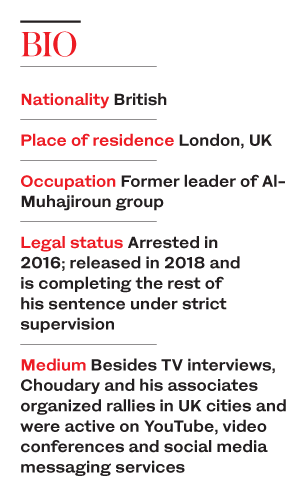DUBAI: A UK-trained lawyer by trade, Anjem Choudary knew just how far to take his rhetoric before it went from freedom of expression to hate speech.
In 2005, he appeared on BBC “HardTalk” after the 7/7 London bombings, which left 56 people dead. Instead of condemning the attacks, he said: “As a Muslim, I must support my Muslim brothers and sisters wherever they are in the world. I must have allegiance with them, I must cooperate with them, I must run with them, and similarly on the other hand, I must have hatred towards everything that isn’t Islam.”
He added: “At the end of the day, when we say innocent people, we mean Muslims. As long as non-Muslims are concerned, they haven’t accepted Islam, and as far as we’re concerned, that’s a crime against God.”
Choudary embraced radical Islamism and joined the extremist organization Al-Muhajiroun, working with Islamist militant leader Omar Bakri Muhammad.
The organization was banned in 2004 under UK anti-terror legislation.
Muhammad later left for Lebanon, and Choudary assumed the leadership position.
Al-Muhajiroun’s official disbanding had little real impact on its British supporters, and in the next few years Choudary led various groups that were just rebadged to circumvent anti-terror laws.
These included Al-Ghurabaa, which hosted links on its website to internet chat forums that justified attacks on civilians.
 Another group, Islam4UK, campaigned for a hardline Daesh-style global caliphate.
Another group, Islam4UK, campaigned for a hardline Daesh-style global caliphate.
Its website featured a picture of Buckingham Palace converted to a mosque.
“What Choudary managed to do is to stay very much on the side of the law, until recently. He made sure he wasn’t inciting actual direct acts of violence, but was very offensive in his hate speech,” Haras Rafiq, chief executive of counter-extremism think tank Quilliam International, told Arab News.
“What he did very cleverly was he talked in broad aspects, he talked about Christian Crusaders, he talked about lots of things in a broad way, very rarely about specific individuals.”
Choudary managed to stay one step ahead of the law, and he knew it. After 9/11 and 7/7, his firebrand style landed him primetime spots on international news talk shows, including on Fox News and CNN.
Pitting him against a moderate, viewership always rose when there was a “good guy vs bad guy” model, as Rafiq put it.
Opinion
This section contains relevant reference points, placed in (Opinion field)
“Like WWE (World Wrestling Entertainment), he (Choudary) became the villain, and they always tried to have a good guy with him. Unfortunately, what that causes is access to an audience that in the past he never had,” Rafiq said.
“Anjem has been very good at being this villain … and he liked it, he enjoyed it, he thought it was good for the cause, and he was, from his perspective, very good at it.”
This posed a significant problem as many viewers began to form opinions on Muslims based on his comments.
Choudary’s charismatic preach-ing earned him the label of a top recruiter for Islamist terrorism in the UK and Western Europe. He is thought to be responsible for indoctrinating many of the UK’s Daesh loyalists.
“Just about everybody I know wants to go and live under the caliphate and the Islamic State, because we’ve lived in this country for so long and with all this gambling, pornography, alcohol … the promiscuity and the kind of, like, divorced lifestyle here,” he said in 2014.

“I know people already there, and I know some people, including myself, who’d love to go. I’ve said that openly to the media that I like to go there, give you my passport, and we can have a nice press conference at Heathrow airport where I can wave goodbye to everyone.”
He told the Washington Post that Daesh is “providing the basic needs to the people in terms of food, clothing and shelter. They’re protecting their life, honor and dignity, wealth etc.”
While Choudary has repeatedly voiced his desire to join the terrorist group, he has never done so. “He’s a coward,” Rafiq said.
“He encouraged, empowered, indoctrinated so many people to join Daesh, and he didn’t do it himself.”
But Choudary’s vocal support for Daesh did finally give the UK the opportunity to arrest him.
On Sept. 6, 2016, he was sentenced to five and a half years in prison.
The judge told him he had “crossed the line between the legitimate expression of your own views and a criminal act.”
Released in October 2018, Choudary is completing the rest of the sentence under strict supervision.



























